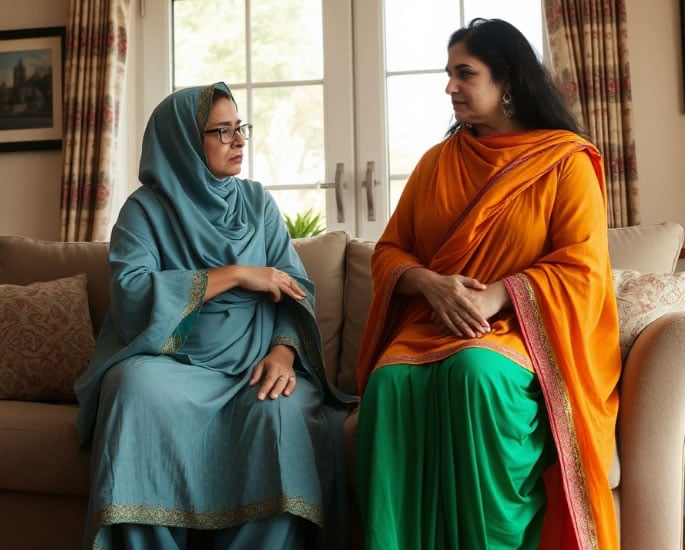"Reputation is such a big thing in the Asian community.”
For many young British Asian women, life plays out on two conflicting stages.
In one, they’re the obedient daughters upholding cultural and religious values where premarital purity and family honour are sacrosanct.
On the other, they’re navigating modern Britain where independence, relationships, and self-expression are everyday experiences.
This double existence isn’t simply about rebellion. It’s about negotiating survival between two cultural systems. Often, this bridge is built with secrecy, silence, and emotional endurance.
Now, a groundbreaking study from the University of Central Lancashire (UCLan) lays bare this inner conflict.
The research exposes how these women forge their own paths while living under the weight of cultural taboos, such as sex.
In doing so, they’re quietly reshaping the meaning of identity, desire, and agency in the British South Asian experience.
The Weight of Izzat

In South Asian families, izzat (honour) and sharam (shame) aren’t symbolic; they govern behaviour.
These values often centre on women’s conduct, especially regarding relationships and sexuality. Breaking social codes affects more than the individual – it stains the family name.
The study confirms how deeply this pressure runs.
As Sonia* stated: “Reputation is such a big thing in the Asian community.”
This fear silences open discussion and restricts personal expression.
Women are told to behave in ways that safeguard family dignity. Any suggestion of a relationship, dating, or even speaking to boys outside of sanctioned spaces becomes a threat.
The silence is so embedded that many grow up with no vocabulary for intimacy or sexual health.
Mental health advocate Ananya Rao-Middleton describes how women are boxed as either “good” or “bad,” based on sexual behaviour.
She said: “Both identities are formed around our sexuality… to ensure we conform to the ‘good’ South Asian woman identity and not fall into the ‘bad’ one.”
This internalised binary leads to hypervigilance.
One participant said being exposed would “trash the image” her family worked hard to uphold. In close-knit communities, exposure spreads fast.
Meanwhile, Khadija* explained: “If one person finds out, then someone else is gonna find out because Asians tend to talk… They’d be like, ‘Look how they’ve brought their daughter up’.”
Shame in these environments isn’t abstract; it’s policed through gossip, comparison, and exclusion. It leaves little room for mistakes and no room for learning.
The Double Life

For many, the only way to experience life outside cultural constraints is to live a double life.
It’s not a romanticised rebellion; it’s a strategy of survival. Juggling conflicting expectations requires constant emotional labour.
One participant admitted she “was leading a double life” and “had to lie about everything”.
From hiding phones to creating fake social plans, these acts are calculated and constant.
British Asian women may delete messages, create secret social accounts, or restrict their visibility online to hide things like relationships.
Everything is curated to avoid drawing attention. Even facial expressions in family photos are policed, for fear they’ll be read as signs of betrayal or misbehaviour.
But secrecy comes with a cost. The fear of discovery never leaves. This stress leads to anxiety, exhaustion, and in many cases, mental health struggles.
Living in two realities makes it hard to trust, confide, or relax.
However, the study reveals nuance. While men and older family members are kept in the dark, mothers sometimes become silent allies.
Speaking about when she announced her relationship, Kira* revealed:
“I told my mum. At first, she didn’t say anything, just looked at me.
“Then she told me to be careful and not to tell anyone else, especially not my dad.”
“She didn’t ask for details, but I think she knew more than she let on. In her own way, I think she was trying to protect me, even if she didn’t agree with it.”
Often, mothers turn a blind eye, not out of acceptance, but hope. They hope the relationship ends in marriage and protects the family’s image.
Mothers urge daughters to maintain “boundaries”, a euphemism for preserving virginity.
This intergenerational complicity shows how shame is passed down in whispers, not lectures. These mothers, recalling their own restrictions, quietly try to cushion the weight their daughters carry.
What emerges is a complex dance: not open rebellion, but silent resistance negotiated behind bedroom doors and family silences.
How Shame causes a Barrier to Healthcare

The taboo around premarital sex doesn’t just restrict personal freedom; it blocks access to healthcare. For British Asian women, walking into a sexual health clinic feels like stepping into enemy territory.
The fear isn’t just about being judged; it’s about being recognised. The idea of bumping into someone from the community, or a GP who shares your background, is paralysing.
Describing her discomfort of seeing a relative as she walked into a sexual health clinic, Naznin* said:
“You’re not supposed to have sex before marriage and he probably thinks that I’m such a bad Muslim.”
However, Priya* revealed that her doctor denied her contraception and instead “began to preach about religion”.
Research reveals that British Asian women often feel alienated and unwelcome in sexual health settings. Religious morality often seeps into clinical care.
To avoid judgment, women travel to clinics outside their hometown or seek vague appointments.
Meera* preferred places where “no one needs to know what you’re going in for”.
These tactics reflect institutional failure. Healthcare, which should offer support, becomes yet another obstacle.
In many schools, sex education either ignores cultural context or avoids naming sexual autonomy altogether.
This leaves British South Asian girls doubly unprepared, silenced at home and underserved in school.
Some community organisations and activists are stepping in.
Collectives such as Gal-Dem, South Asian Sisters Speak, and Brown Girl Therapy provide safe spaces for open conversations. But these remain fringe efforts, not systemic solutions.
The NHS and schools must urgently address cultural safety. Providers from the same background must be trained not to replicate cultural judgment, but to support patients in need.
The Quiet Negotiation of Sexual Agency

Claiming sexual agency in this environment isn’t about throwing off tradition. It’s about reinterpreting it. Women are creating personal frameworks that allow them to reconcile intimacy with identity.
Divya described: “You know it’s wrong, but you can make yourself believe it’s not wrong… and then all that [shame] just kind of goes away.”
For some, boundaries are personalised.
Some may engage in intimacy but avoid penetrative sex. Virginity becomes a symbolic threshold that, if untouched, maintains respect.
Others weigh the seriousness of the relationship, as Naznin said:
“If you’re gonna get married to him, then I don’t think it’s really a big problem.”
These are survival logics. They offer young women a middle ground between cultural rules and lived reality. Over time, this becomes a form of silent empowerment.
Writer and activist Sangeeta Pillai describes this as unlearning “miseducation… in the name of culture”.
She says shame around female desire is a “problematic” construct that must be dismantled.
For many, the real taboo isn’t sex; it’s autonomy. The ability to make choices without fear is still seen as dangerous. But this is changing, slowly and quietly, through everyday negotiations.
This process isn’t a rejection of heritage. It’s the creation of something hybrid. An identity where cultural respect coexists with personal truth.
A Future of Shifting Identities

Many British Asian women are part of a cultural evolution, reshaping what it means to be South Asian and female in modern Britain.
The binary of “Westernised” versus “traditional” no longer holds. These women occupy a third space.
Iqra* said: “You can’t always do what religion tells you to do because it’s going to turn you into a whole completely different person.”
This isn’t a dismissal of faith. It’s a demand for balance.
The study shows that while women are aware of religious expectations, many prioritise consent and mental health in relationships.
These are not isolated attitudes. Social media, pop culture, and diaspora dialogues are shifting norms.
Platforms like TikTok and Instagram are full of South Asian creators openly discussing sex, body autonomy, and religious trauma.
Young women see others voicing what they’ve only whispered.
This digital validation fuels real-life change, albeit slowly. As daughters grow into mothers, the silent complicity of past generations may give way to actual conversations.
Even marriage, once seen as the only legitimate end goal, is being redefined.
Many women still hope for it, but on their own terms. Love, timing, and emotional readiness matter more than community expectations.
This shift will inevitably change family structures, religious interpretations, and community expectations.
It’s not a revolution with slogans; it’s a quiet transformation, happening in bedrooms, clinics, and private journals.
British Asian women navigating sexuality carry heavy burdens: silence, shame, healthcare discrimination, and internal conflict.
Yet through secrecy, they find strategy. Through fear, they build resilience.
These women are forming identities rooted in choice, not coercion. Their journeys are about more than sex; they’re about freedom, self-worth, and belonging.
To move forward, communities must let go of shame as a tool of control.
Schools and healthcare providers must confront the cultural blind spots that fail women. And mothers, sisters, and friends must start speaking openly.
Until then, the revolution will remain quiet but unstoppable.






























































